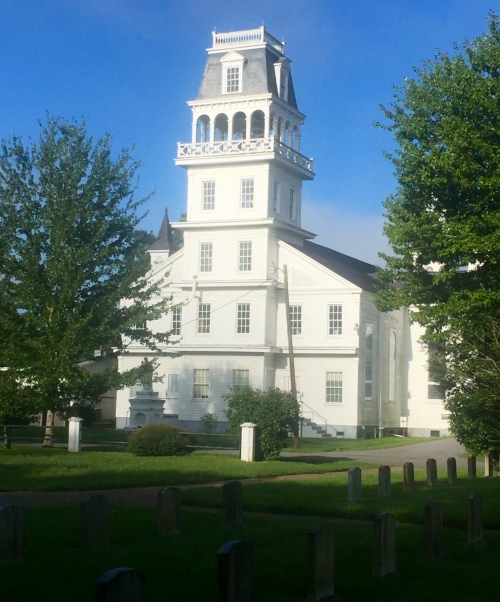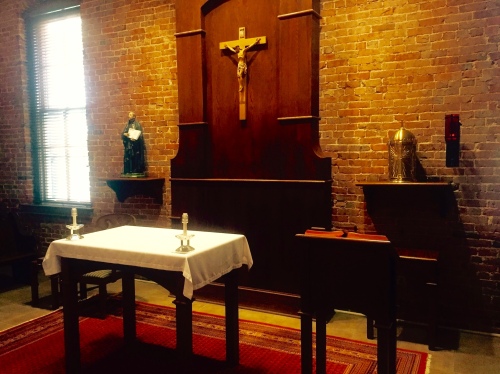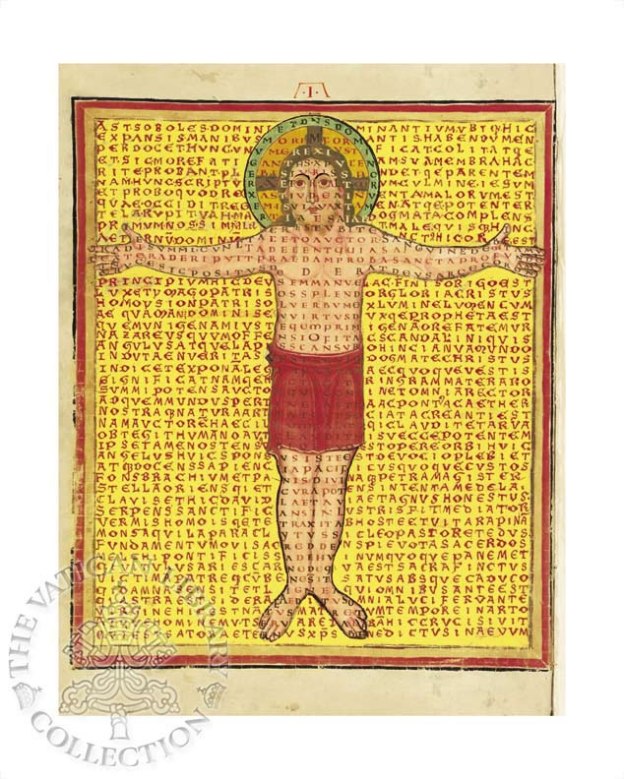Thursday in Second Week of Lent
February 28, 2013
Church Divinity School of the Pacific
Berkeley, CA
Jeremiah 17:5-10
Psalm 1
Luke 16:19-31
“They shall be like a tree planted by water, sending out its roots by the stream.” (Jer. 17:8a)
If we imagine Lent as a journey through the wilderness, by now we have taken a bend in the road.
We can’t turn around and see Ash Wednesday behind us.
The memory of ash on our foreheads is not as strong.
But perhaps the words of the Ash Wednesday liturgy still echo in your ears: “Remember that you are dust, and to dust you shall return.”
Those words call us to penance, rightly and surely.
But, remember also the ultimate referent of those words is God, the creator and source of all life.
God created all that is, setting forth and ordering all of the tremendous beauty, diversity and mystery of creation.
Remember you are made from the dust of the earth.
Remember you are made from dust that came from the stars shining above.
Remember you are dust from which plants spring forth.
Remember that when you die you will return back to the elemental realities God formed.
Remember God the Creator.
Forgetting God the Creator, the source of all being, is the essence of idolatry.
To forget God as the source of all is to break the First Commandment – “I am the Lord your God.”
When we forget this, then we forget the Second Commandment, “You shall not make for yourself any idol.”
Jeremiah addresses this forgetfulness when he speaks to the people of Israel: “Cursed are those who trust in mere mortals and make mere flesh their strength, whose hearts turn away from the Lord.” (Jer 17:5)
Immediately before in this chapter, Jeremiah has condemned the people for turning away from Torah to idols.
That turning away includes looking to foreign powers instead of God.
Israel was threatened from all sides by foreign powers – Egypt, Assyria, Babylon.
Rather than trust in God, Israel sought political solutions by turning to their own strength and by seeking alliances with other powers.
In the course of these pursuits, Israel also turned to idolatry, forgetting God’s covenant with Israel made at Sinai.
For Jeremiah, idolatry happens when the people of God move from relying on God the Creator and instead turn to their own strength.
This indeed is the origin of sin – turning away from God.
The problem is not simply in turning away from God.
Sin involves losing sight of God as the source of all creation.
Sin disfigures God’s plan for creation – that all should live in harmony and unity with God, with each other, and with all that God has created.
Jeremiah uses a striking image for this idolatry – sin is like a drought.
He declares that those who put their own agenda before God’s desire for creation will be:
“like a shrub in the desert, and shall not see when relief comes. They shall live in the parched places of the wilderness, in an uninhabited salt land.” (Jer. 17:6)
By putting other things in the place of God, sin dries up and shrivels the vibrancy of life.
Sin causes the leaves and buds and flowers and fruits to fall off the branches of our life until we are left with a broken stick.
We find a similar image of sin in Jesus’ parable of the rich man and Lazarus in the Gospel of Luke.
In this parable, the rich man dines sumptuously his whole life; he is blessed with many fine things.
Even his burial shows that he had the means to ensure not only a comfortable life but a seemly transition to the world to come.
His wealth would have been interpreted by Luke’s audience to mean that God had favored him.
And then comes the great reversal that is the core of Luke’s gospel.
The poor man, Lazarus, is exalted to the bosom of Abraham and the rich man is cast down to Hades.
The rich man went down to Hades not because he was rich but because he did not heed the word of God regarding his wealth.
The Scriptures of Israel that Jesus taught from held that the people of God must care for the poor in their midst.
Moses clearly taught this when in the Torah provisions are made for the poor and aliens in the midst of Israel.
Jeremiah taught this when he wrote: “For if you truly amend your ways and your doings, if you truly act justly one with another, if you do not oppress the alien, the orphan, and the widow . . . and if you do not go after other gods to your own hurt, then I will dwell with you in this place.” (Jer 7:5-7)
For Jeremiah, not caring for the poor in your midst is linked to idolatry.
They are linked because both show a disregard for God’s plan that all be in relation with God and with each other.
And when the rich man begs Abraham to send Lazarus to cool his thirst, Abraham tells him it is too late – his way of life has sealed his fate.
And neither does Abraham allow Lazarus to go back to the rich man’s brothers to warn them of their fate – the words of Moses and the prophets are sufficient.
Indeed, even if someone comes back from the dead, they will not believe.
In this world, the rich man never saw Lazarus.
He neglected Torah by neglecting Lazarus.
And that neglect shows that he placed himself before others.
That attitude of superiority in itself was an act of idolatry because it signaled that God was not at the center of life for the rich man.
And so he did not respond to God’s desire for communion among all created things.
And for that, he thirsted.
Sin had rendered him dry and without the vibrancy of life.
There was no water for him.
Sin had ruined all the comforts he had carefully laid up.
Scripture is clear.
There are two ways – a way that leads to flourishing and life and a way that leads to dryness and lifelessness.
Both Jeremiah and the psalm imagine one who follows the wisdom of God as being like a flourishing tree that has set down roots by running waters.
In contrast, to not heed God is to be like a withered shrub or chaff that the wind blows away.
I imagine these two ways as the way of the barren branch and the flowering branch.
[Pull out budding branch]
We can imagine ourselves, our society, and our planet as a budding branch.
And it can become a flowering branch or a barren branch based on our actions.
We become the barren branch when we do not obey God’s desire for us, for humanity, and for creeation even when we know words of God spoken by Moses, the prophets, Jesus. [pluck buds]
Our society becomes a barren branch when we neglect the poor right under our feet. [pluck buds]
When we are willing to be complicit in injustice. [pluck buds]
When the diminishment of others is not our concern. [pluck buds]
Our world becomes this barren branch when we consume and don’t care. [pluck buds]
When we desire products that rely on rare metals whose mining means poisoned waters for indigenous people and civil wars in corners of the world remote to us. [pluck buds]
This has been the driest winter in the Bay Area on record.
The sunshine you enjoyed today was not good news.
It was as bad news as Hurricane Sandy was. [pluck last buds]
Like this barren branch, it is a sign of the destruction that human sin causes among God’s creation.
We have created barren branches in ourselves, in society, and upon our earth.
[Put down barren branch.]
And there is the way of the flowering branch.
Psalm 1 and Jeremiah teaches that the wise and blessed are those who trust in the Lord and delight in God’s Law.
They are like trees by streams of water, bursting with green leaves, flowers and fruit.
This is the way of flourishing: choosing the way of wisdom that places God at the center and as the source of creation.
Discerning God as source and center allows us to see the goodness and communion God desires for all of creation.
To return to this sense of God’s desire for us requires repentance.
It requires seeing the world and our lives and our society not as we want it but as God does.
[Hold up flowering branch]
Repentance brings forth the buds of the branch and causes flowers to bloom.
When we turn to God and in prayer discern God’s will for us, flowers bloom.
When we heed God’s call to care for the poor and hungry, flowers bloom.
When people make a stand for a society that is just, honest, and fair, flowers bloom.
When greed gives way to generosity, flowers bloom.
When we stop consuming and start sharing, flowers bloom.
And is it possible?
Can we imagine a way past the destruction of creation that looms on the horizon, that is indeed upon us?
Might the barren branch become the flowering branch in the desolate places we have made?
Amid the melting ice, warming oceans, and parched land?
Might the flowers on the branch bloom?
There is one who has come back from the dead to warn us.
And not just to warn us, but to give us abundant life.
[Put both branches together]
He is the branch that has sent forth new shoots from the root of Jesse.
He is the one who says, “Behold, I make all things new” (Rev. 2:15).
Blessed are those who walk in the way of the Lord for they shall bring forth fruit in due season with leaves that do not wither.









